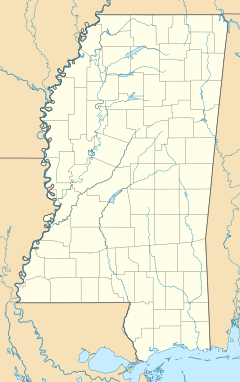Camargo, Mississippi facts for kids
Quick facts for kids
Camargo, Mississippi
|
|
|---|---|
| Country | United States |
| State | Mississippi |
| County | Monroe |
| Elevation | 223 ft (68 m) |
| GNIS feature ID | 709319 |
Camargo is a ghost town located in Monroe County, Mississippi, in the United States. A ghost town is a place that was once a busy community but is now mostly empty or abandoned. Camargo used to be a lively port town on a creek. However, it slowly disappeared after a new railway was built nearby.
History of Camargo
Camargo was first planned out in 1847. It was named by a soldier who had fought in the Mexican–American War. He named it after a military camp he knew in Mexico. The town was built along Old Town Creek.
A Busy River Town
In its early days, Camargo was a very active place. People called it a "flourishing port." This meant it was a busy center for trade and travel by boat. The town had many important buildings. There were schools for children and stores for shopping. It also had a special landing spot for steamboats. A church, a post office, and a cemetery were also part of the community. There was even a Masonic Lodge, which is a meeting place for a social group.
The Civil War and Camargo
During the American Civil War, a small battle took place near Camargo. This happened on July 14, 1864. Soldiers from the Confederate States Army won this skirmish.
The Railway's Impact
In the late 1840s, a new railway line opened. This was the Mobile and Ohio Railroad. It was built about 4 miles (6.4 km) west of Camargo. People in Camargo hoped to connect their town to this new railway. In 1854, a company was even started for this purpose. It was called the Camargo Branch Railroad Company. However, the railway line from Camargo was never built.
With the success of the new railway, Old Town Creek became less important. Boats stopped using it as much. Over time, the creek filled up with trees and other things. This made it impossible for boats to travel on it. River towns like Camargo struggled to compete with the faster trains. Because of these changes, Camargo was mostly abandoned by the 1870s. It became the ghost town we know today.
 | James Van Der Zee |
 | Alma Thomas |
 | Ellis Wilson |
 | Margaret Taylor-Burroughs |



